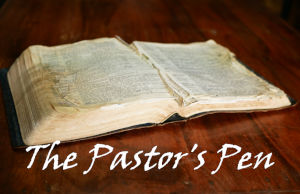Jeremiah was not compelled by promises of positive results, he simply did as God instructed. The 12 tribes of Israel were torn apart due to idolatry, yet Jeremiah remained a faithful prophet. The 10 northern tribes had been taken captive by the Assyrians, and shortly Jeremiah would witness the captivity of Judah by Babylon.

Jeremiah would remain unmarried (Jer 16:2), and he was often overwhelmed by tears at the suffering of rebellious Israel (Jer 9:1). Jeremiah was a young man when he began prophesying to Judah during the reign of King Josiah in 627 B.C. until after the destruction of Jerusalem in 586 B.C. The Lord told him, before I formed you in the womb I knew you, and before you were born I consecrated you; I appointed you a prophet to the nations (Jeremiah 1:5). This was God’s mission, Jeremiah was God’s mouthpiece, and the nation was called to obedience or further judgement would come.
It was the 4th year of King Jehoiakim, and partnered by his secretary Baruch, Jeremiah said; I am banned from going to the house of the LORD, so you are to go. You shall read the words of the LORD from the scroll that you have written at my dictation. You shall read them also in the hearing of all the men of Judah… (Jeremiah 36:5-6). Consequently, the officials had the scroll read to them also, then they instructed Baruch, “Go and hide, you and Jeremiah, and let no one know where you are” (Jer 36:19). The officials proceeded to read the scroll to the King. As three or four columns were read, the king would cut them off with a knife and throw them into the fire in the fire pot, until the entire scroll was consumed in the fire… 24 Yet neither the king nor any of his servants who heard all these words was afraid… (Jeremiah 36:23-24). Unrepentance and arrogance had hardened their hearts to God’s Word so that they did not fear what they should have feared.
Tenacity for God marked Jeremiah’s life. Then Jeremiah took another scroll and gave it to Baruch the scribe… who wrote on it at the dictation of Jeremiah all the words of the scroll that Jehoiakim king of Judah had burned in the fire. And many similar words were added to them (Jeremiah 36:32). Fear of King Jehoiakim paled in comparison to Jeremiah and Baruch’s fear of God. Judgement was coming!
While Jeremiah was seeking safety, the officials were enraged, and they beat him and imprisoned him… (Jer 37:15). Later, they took Jeremiah and cast him into the cistern of Malchiah… they let Jeremiah down by ropes. There was no water in the cistern, but only mud, and Jeremiah sank in the mud (Jer 38:6).
And so it happened, Jeremiah chapter 39 records Nebuchadnezzar king of Babylon and all his army capturing Jerusalem. The belligerent officials were killed. King Zedekiah’s sons were also killed in front of him. Nebuchadnezzar then put out the eyes of Zedekiah and bound him in chains to take him to Babylon (Jer 39:7). The King’s house was burned, the city walls were broken down, and Nebuchadnezzar carried into exile to Babylon the rest of the people who were left in the city (Jer 39:9). What an avoidable tragedy!
Jeremiah 39:11-12 tells us that Nebuchadnezzar gave command concerning Jeremiah saying… “Take him, look after him well, and do him no harm, but deal with him as he tells you.” God is faithful to His Word and to His servants. Jeremiah lived on to prophesy of hope and of a restored nation. He leaves us with an amazing example to follow.
